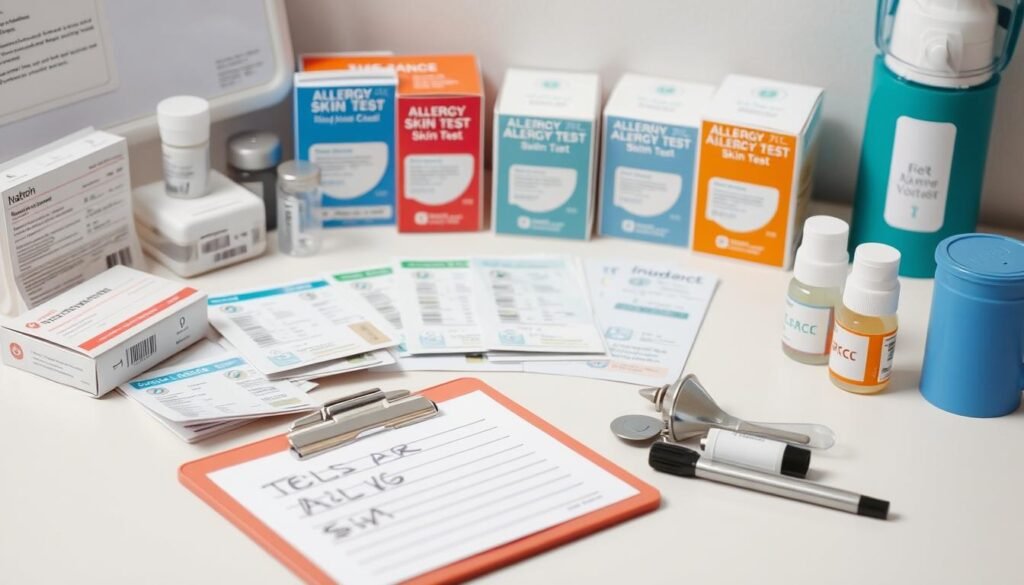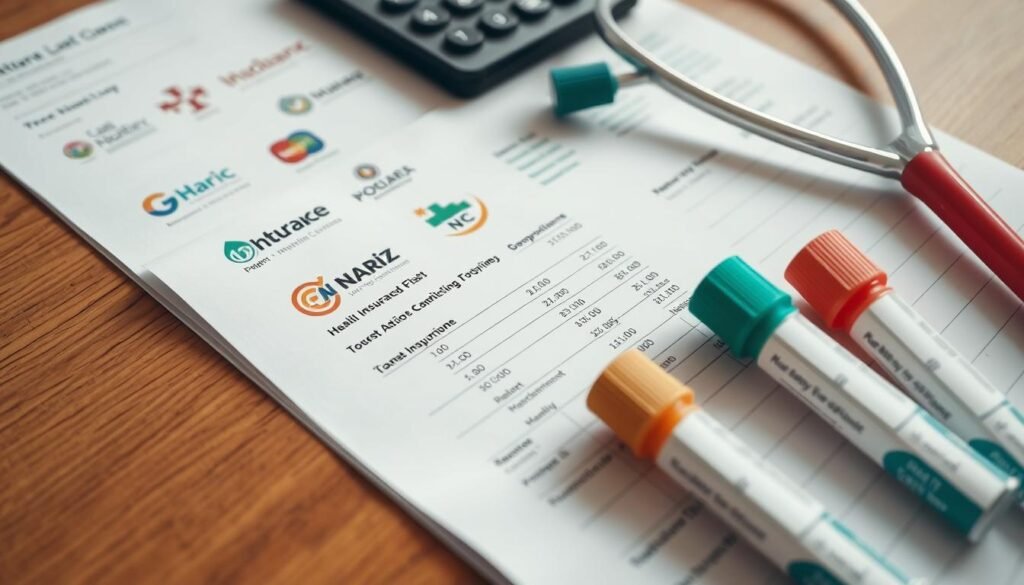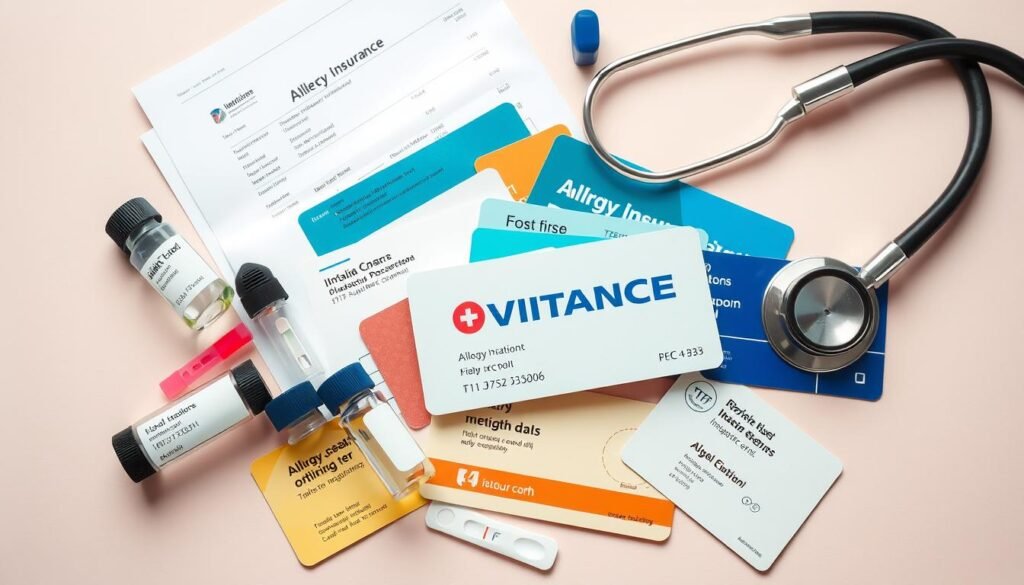Ever wondered about the costs of How Much Is An Allergy Test With Insurance? Knowing how much an allergy test costs with insurance is key. It’s especially important if you’re dealing with ongoing allergy symptoms. Insurance coverage can greatly affect these costs, making diagnosis more affordable.
In this article, I’ll cover the basics of allergy testing. You’ll learn what to expect, the factors that affect costs, and how to use your insurance benefits. We’ll explore average U.S. costs and out-of-pocket expenses. My goal is to give you the info you need to make smart health choices.

Key Takeaways
- Understanding the costs of allergy tests is crucial for planning your budget.
- Prices for allergy tests can vary a lot, depending on the type and where you are.
- Insurance can impact how much you pay for tests.
- Always check your insurance policy for coverage details.
- Being proactive about your benefits can save you money.
- Knowing your allergies can greatly improve your life quality.
- There are often affordable options for allergy testing available.
Understanding Allergy Testing
Allergy testing is key to finding out what causes allergic reactions. Knowing what allergies you have can change your life and health care. In the US, many want to know the cost of an allergy test before they get one. This helps them prepare for any expenses.
What Is Allergy Testing?
Allergy testing is a medical test to find out what causes allergies. It can show what allergens cause symptoms like sneezing and itching. The test results help find the best treatment for allergies. Knowing the cost of an allergy test in the US is important, as it depends on the type and provider.
Types of Allergy Tests Available
There are many ways to test for allergies, each with its own benefits:
- Skin Prick Test: Small amounts of allergens are put on the skin to see reactions.
- Blood Test: This test looks at the immune response to allergens by checking blood antibodies.
- Elimination Diet: This involves removing suspected allergens from food and then adding them back to see reactions.
Choosing the right test depends on your medical history and symptoms. Each test gives different insights into what causes allergies, helping improve health.
| Type of Allergy Test | Process | Common Uses |
|---|---|---|
| Skin Prick Test | Small pricks are made on the skin with allergens applied. | Common allergens like pollen, pet dander, and food. |
| Blood Test | A blood sample is taken to measure antibodies. | Diagnosing severe allergies or those with skin conditions. |
| Elimination Diet | Foods are removed and reintroduced gradually. | Identifying food allergies. |
How Much Is An Allergy Test With Insurance
Knowing the cost of an allergy test with insurance is key for those thinking about it. Several things affect the price, like the tests done, your insurance, and the doctor’s network.
Factors Influencing the Cost
Several factors play a role in the cost of allergy tests with insurance:
- Type of allergy test: Skin prick tests, blood tests, and patch tests vary in price.
- Insurance coverage: Policies differ, affecting how much of the test is covered.
- Provider network: Tests from in-network providers are often cheaper than those from out-of-network ones.
- Deductibles and copays: Your copay for an allergy test can change based on your policy and deductible status.
Common Price Ranges
Price ranges for an allergy test with insurance can be wide. Here’s a quick overview:
| Allergy Test Type | Estimated Cost | Typical Insurance Coverage |
|---|---|---|
| Skin Prick Test | $0 – $150 | Usually covered |
| Blood Test (RAST) | $100 – $300 | Partially covered |
| Patch Test | $200 – $500 | Varies greatly |

Insurance Coverage for Allergy Testing
Understanding insurance coverage for allergy testing is key to knowing what I’ll pay out of pocket. Knowing what my insurance covers helps me make smart health choices. Most health insurance plans cover allergy testing if it’s needed. But, the details can vary a lot between providers and policies.
What Does My Insurance Policy Cover?
To see if insurance covers allergy tests, I need to look at my policy closely. It usually covers the test itself and the doctor’s interpretation of the results. Some policies might limit the types of tests they cover. So, the first step is to call my insurance to check on allergy testing coverage.
Do All Insurance Plans Cover Allergy Tests?
Not all insurance plans cover allergy tests. Each plan has its own rules about what tests are covered. It’s crucial to ask my insurer if they cover allergy testing. Knowing how different plans cover allergy testing helps me plan and save on medical costs.

Cost of Allergy Tests with Insurance
Learning about the costs of allergy testing can be confusing. Knowing the average costs in the US, especially for tests covered by insurance, is key. The prices for allergy tests vary a lot, due to many factors.
Average Costs in the US
In the US, the cost of allergy testing with insurance can vary a lot. People usually pay between $100 to $1,000, depending on their insurance and the test type. Skin tests are often cheaper than blood tests. Knowing how much insurance covers helps with budgeting.
Breakdown of Cost Components
Many things add up to the total cost of allergy testing. Knowing what these are helps understand the expenses better.
| Cost Component | Estimated Price Range |
|---|---|
| Doctor’s Consultation | $50 – $250 |
| Allergy Skin Test | $300 – $600 |
| Blood Test | $200 – $1,000 |
| Lab Fees | $100 – $300 |
| Follow-up Appointments | $50 – $200 |
Looking at these different parts helps predict the costs better. Knowing what insurance covers helps manage these expenses.

Out-of-Pocket Expenses for Allergy Tests with Insurance
Thinking about allergy tests with insurance means looking at the costs. It’s important to know how insurance works. This includes deductibles and copays. Understanding these helps me plan for the costs of the test.
Understanding Deductibles
A deductible is the amount I pay before insurance kicks in. For example, if my deductible is $1,500, I must cover that first. Until then, the costs can be high, so I need to budget for it.
How Copays Affect Total Costs
After meeting my deductible, copays come into play. The cost of a copay varies by insurance plan. It’s usually between $10 and $50 per visit. If I need many tests, these costs can add up fast. It’s key to understand how these expenses fit into my budget for testing.

| Expense Type | Typical Amount |
|---|---|
| Deductible | $1,000 – $2,500 |
| Copay per Test | $10 – $50 |
| Potential Total for 3 Tests | $30 – $150 (plus deductible) |
How to Navigate Insurance Benefits for Allergy Tests
It’s important to understand how to use insurance for allergy tests. Knowing how to check coverage is a key first step. This helps avoid surprise costs and makes sure I get the tests I need.
Steps to Verify Coverage
To start, I need to follow these steps to check coverage:
- I gather my insurance card and any notes from doctors.
- I find out which allergy tests my doctor suggests and if they’re covered.
- I call my insurance to ask about benefits for these tests.
- I ask about any costs I might have to pay, like deductibles or co-pays.
- I write down what the insurance person tells me so I can remember it later.
Contacting Your Insurance Provider
When I call my insurance, being ready helps a lot. Here’s how I make the call go smoothly:
- I tell them exactly which tests I need to know about.
- I ask how long it will take to get my money back if I have to pay first.
- I ask if there are doctors I should see to get the most from my insurance.
- I learn about the appeals process in case of denied claims or unexpected costs.
Are Allergy Tests Worth the Money?
Figuring out if allergy tests are worth it means looking at their benefits. For me, finding out what causes allergic reactions is a big deal. It changes how I take care of my health and my lifestyle.
Benefits of Knowing Your Allergies
Knowing your allergies helps you make better choices. This leads to better health. Some benefits include:
- Managing allergies better, which means fewer emergencies.
- Living a better life by avoiding things that make you uncomfortable.
- Getting treatments that really work from your doctor.
- Telling family and friends about your allergies so they can help.
Potential Cost Savings in the Long Run
Allergy tests might cost a lot at first. But, are they worth it? The long-term savings can be huge. Here’s why:
- Staying away from allergens saves money on medical bills and meds.
- Not missing work because of allergies saves money too.
- Staying safe from serious allergic reactions saves a lot of money and stress.
Affordable Allergy Testing with Insurance
Looking for affordable allergy testing with insurance? Finding in-network providers is key. Using in-network doctors can cut down costs. I check with my insurance to find in-network allergists near me. This way, I get quality care without breaking the bank.
Finding In-Network Providers
Here’s how to find affordable allergy testing:
- Visit my insurance company’s website or call their customer service for a list of in-network allergists.
- Use online directories made for insurance networks.
- Always confirm with the allergist’s office if they accept my insurance before my appointment.
Discount Programs and Financial Assistance
If costs are still a problem, look into discounts and financial help. Many clinics offer fees based on income. This can make allergy testing more affordable. Plus, some nonprofits help people with little money get the healthcare they need, including allergy tests.
Don’t forget about medication discount cards and coupons. They can greatly reduce the cost of tests and medications.
| Resource Type | Description | How to Access |
|---|---|---|
| Sliding Scale Clinics | Clinics that adjust costs based on income. | Contact local health clinics directly. |
| Nonprofit Organizations | Organizations providing financial assistance for healthcare. | Search online for local resources. |
| Medication Discount Cards | Cards offering discounts on medications. | Available through various pharmacies or online. |
Conclusion
In this article, we’ve looked at the cost of allergy tests with insurance. Knowing this is key for anyone thinking about getting tested. It affects my budget and health planning.
Looking into insurance options can also help with costs. By checking coverage and finding in-network providers, I can save money. This makes allergy testing more affordable.
Getting tested for allergies is about more than money. It’s about staying healthy and avoiding serious problems. By understanding insurance and how to save, I can make choices that are good for my health and wallet.
FAQ
How much is an allergy test with insurance?
The cost of an allergy test with insurance varies. It can be $0 if fully covered or several hundred dollars. This depends on copays and deductibles.
Does insurance cover allergy tests?
Yes, most insurance policies cover allergy tests if they are needed. Always check with your provider for details on coverage.
What types of allergy tests are available?
There are several allergy tests. These include skin prick tests, blood tests, and elimination diets. Each is used based on your allergy history.
What is the charge of an allergy test without insurance?
Without insurance, an allergy test costs between $300 and $1,000. This price varies by test type and provider.
What factors influence the cost of allergy testing with insurance?
Several factors affect the cost of allergy testing with insurance. These include the test type, provider network, insurance coverage, and if the test is medically necessary.
How can I find affordable allergy testing with insurance?
To find affordable testing, look for in-network providers. Also, ask about discount programs or financial help.
How do copays affect the total cost of an allergy test?
Copays are fixed amounts you pay for services, like allergy tests. Your copay can greatly affect your costs.
What is the average cost of allergy tests in the US?
In the US, allergy test costs vary. They range from $300 to $1,000 without insurance. Insurance often lowers these costs.
Are allergy tests worth the money?
Yes, allergy tests are worth it. They help manage your health and can save money in the long run by avoiding triggers.
How can I verify my insurance coverage for allergy tests?
To check your coverage, contact your insurance provider. Ask about covered tests and any costs you might pay.

